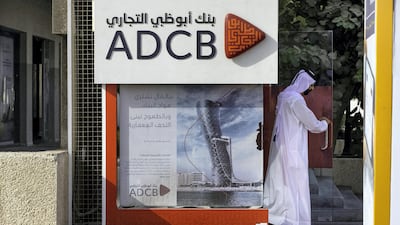The boards of Abu Dhabi Commercial Bank and Union National Bank have agreed to a merger to create an entity that will take over Al Hilal Bank and become the third largest lender in the UAE.
The merged entity will have an asset base of Dh420 billion, the lenders said in a joint statement on Tuesday to the Abu Dhabi bourse, where ADCB and UNB shares are traded.
Sheikh Mohamed bin Zayed, Crown Prince of Abu Dhabi and Deputy Supreme Commander of the UAE's Armed Forces, tweeted that the merger will create a more durable banking group.
"The merger of Abu Dhabi Commercial Bank, Union National Bank and Al Hilal bank is in line with the economic vision of the UAE and creates a strong banking group that has human capital and financial capabilities that will bolster the competitiveness of the economy and its future outlook," Sheikh Mohamed wrote on Twitter.
"We bless this step that will bolster the business environment, guarantee its sustainability, support development projects and create investment opportunities in the vital sectors according to the best international standards," he added.
The transaction, which has been recommended unanimously to shareholders by the boards of ADCB and UNB, is subject to regulatory and shareholder approvals to be sought in the coming weeks, the banks said.
Read More
• What a UAE bank merger might mean for consumers
• Business Extra podcast: ADCB merger would shake up banking sector
The deal follows the tie-up of two of Abu Dhabi's biggest lenders, when National Bank of Abu Dhabi and First Gulf Bank became First Abu Dhabi Bank in 2017, creating a $188bn banking powerhouse. Banks in the Arabian Gulf are increasingly looking to consolidate in a bid to gain scale and cut costs.
The new banking group will carry the ADCB identity and will continue to benefit from strong institutional backing, through the government of Abu Dhabi’s majority ownership. Al Hilal Bank will retain its existing name and brand, and operate as a separate Islamic banking entity within the group.
“The UAE banking sector is set to have a powerful new banking group” following the tie-up of the three lenders, the banks said. “Greater scale will permit larger scope for financing to support the UAE’s economic agenda for diversification and growth, and more investment in the bank’s people, technology and infrastructure.”
ADCB, currently the emirate’s second-largest lender, and UNB are majority-owned by the Abu Dhabi Government. The emirate controls 100 per cent of Al Hilal Bank through Abu Dhabi Investment Council, the state-owned company that has tied-up with Mubadala Investment Company.
With the merger, ADCB will become the fifth-largest bank in the Arabian Gulf. With a customer base of around one million, the new lender will account for 15 per cent of total assets in the UAE, 21 per cent of retail loans market and 16 per cent of deposits, according to the data as of September 30, 2018.
“UAE is an overbanked market and the merger amongst these three banks was very much expected to materialise because of common ownership," said Hettish Karmani, the head of research at Muscat-based U-Capital. "Overall, I believe such M&A will boost the profitability of the sector and will give the banks more pricing power.”
ADCB on Tuesday also reported a 27 per cent year-on-year rise in fourth quarter net income to Dh1.36bn, beating the Dh1.1bn median estimate of three analysts polled by Bloomberg.
ADCB shares have gained 26 per cent while UNB stocks have jumped 37 per cent since the announcement of the merger talks in September last year.
Under the terms of the deals announced on Tuesday, the proposed transaction between ADCB and UNB will be executed through a merger in which ADCB will issue 0.5966 shares for every UNB share. The exchange ratio implies a premium to UNB shareholders of 0.6 per cent over January 28 closing price. UNB shares will be delisted from the Abu Dhabi Securities Exchange when the deal becomes effective. Al Hilal Bank will be acquired by the combined ADCB-UNB entity for approximately Dh1bn.
Al Hilal Bank will be acquired by the combined ADCB-UNB entity for approximately Dh1bn.
The deal is expected to be completed within the first half of this year, which will give the government of Abu Dhabi, through ADIC, 60.2 per cent holding of the combined bank. ADCB shareholders will own 28 per cent and UNB shareholders will own 11.8 per cent of the combined bank, according to the statement.
“In addition to cost and revenue synergies, including cross selling opportunities, the bigger equity book of the combined entity can easily target larger projects,” Chiradeep Ghosh, banking analyst at Bahrain’s Sico Bank, said.
Eissa Mohamed Al Suwaidi, the current chairman of ADCB will be chairman designate of the new banking group and the bank’s chief executive Ala’a Eraiqat is the group chief executive designate of the new entity.
“A robust and innovative financial sector is crucial to the long-term prosperity of the UAE, as the country forges its transition to a diversified economy,” Mr Al Suwaidi said. “The enlarged ADCB will have the scale and expertise to play a central role in the next stage of the UAE’s economic development.”


